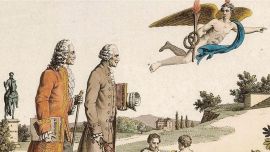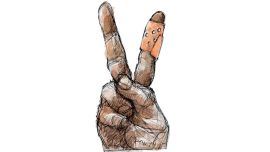Today is neither Good Friday nor Easter Sunday but the Easter Vigil, which perhaps reflects the current state of political play, as well as anything with a Calvary far more visible than any resurrection for now – a waiting game for the sacrifices yet to be made with ever shorter fuses to see how the government reacts to the highest monthly inflation in 20 years, the main news of an abbreviated week.
Given the lack of any decisive developments, Easter itself emerges as this column’s topic to be compared with 34 Semana Santas followed from the Buenos Aires Herald newsroom in two different addresses (even if we never worked Maundy Thursday with no newspaper the following day). Those autumn half-weeks were uneventful more often than not but there was more than one exception to prove the rule.
The most memorable Easter would undoubtedly be 1987 – rocked by Aldo Rico’s Campo de Mayo carapintada Army mutiny commencing exactly 35 years ago today (Maundy Thursday in that year) and famously ending with Raúl Alfonsín’s: “Happy Easter, the house is in order” on the Sunday. As it turned out, Alfonsín was not so much speaking for himself as for his country – over the next two years he was on a downward slope eventually sliding into hyperinflation, but in retrospect that Easter marked the final end of over half a century of alternation between elected governments and military juntas, whatever his own ultimate failures (to which the concessions subsequently made to the mutineers contributed by undercutting his credibility). An iconic defining moment in the consolidation of Argentine democracy which was compared to King Juan Carlos standing up to the Tejero coup in Spain only six years previously (neither Alfonsín nor the Bourbon monarch ended happily as a head of state for all their services to democracy, it might be added).
The 30th anniversary of that Easter rising was the subject of a mini-supplement in the Herald then in the last three months of its existence but today it seems very much a milestone of the past century with military coups so inconceivable and police mutinies now more of a danger than any martial mischief – and with drug-trafficking gangs having greater firepower than any of those security forces, according to some exaggerated fears.
That April of 1987 was already memorable for the six-day visit of John Paul II less than a fortnight before Aldo Rico’s mutiny – nothing in my four decades has done more to revitalise an already waning official religion with the single exception of the surprise emergence of Cardinal Jorge Bergoglio as Pope Francis in 2013. Although eclipsed in most memories by the military upheavals shortly afterwards, this visit was a mega-event drawing crowds of up to 300,000 – partly in gratitude to the Polish pontiff for his services in averting war between Argentina and Chile less than a decade previously in the first years of his papacy, but also the expression of a mass piety buried in the national subconscious and needing such triggers to erupt into the open, along similar lines to the feelings about the “lost sisters” of the Malvinas revived by the 40th anniversary of the South Atlantic war a fortnight ago.
More or less throughout the last century Easter was just such a catalyst annually activating that subconscious before secularisation gathered pace in this century. The stereotype of Argentina as a Catholic nation was stoutly upheld by the censuses of 1970 and 1980 registering the percentage adhering to the official creed as 94.3 and 94.03 percent respectively (both censuses the products of military governments with a cross and sword mentality) but these were statistical myths with only a few million people attending Mass every Sunday (still several times the football stadium crowds watching the national sport on the same day). Yet come Easter in those decades and suddenly all the cinemas and television channels (only three or four back then) would be showing films like The Greatest Story Ever Told and The Ten Commandments, while most citizens assumed an expression of solemn piety much as they would a face-mask when going out in these pandemic times. No genuine godliness but not sheer hypocrisy either with several layers like an onion. The vast majority shunned churchgoing but on the other hand at least three-quarters of taxis had rosaries dangling from their windscreen mirrors, while the annual pilgrimage to Luján and Saint Cajetan’s Day in Liniers were both capable of drawing seven-digit turnouts with huge crowds in the religious processions in less populated provinces.
Far from The Ten Commandments being screened at cinemas long displaced from Corrientes Avenue and overtaken by modern technology, there were neither cinemas nor church masses for several months not so long ago. This Easter unfolds in a sharply different political and social context to 35 years ago.
Not much space to recall other Easters since then and not too many worth recalling either. But the Easter of 1991 gave birth to Mercosur in the Paraguayan capital of Asunción almost simultaneously with convertibility – many trials and tribulations after a broadly successful first decade and in the wars yet again these days with Brazil proposing to go it alone in slashing its tariffs by 10 percent in defiance of perhaps the world’s most protectionist trade bloc (it would seem that the other members seek to be unilateral, bilateral, multilateral or anything but Mercosur). Yet through to this year Brazil remained Argentina’s leading trade partner (even if edged at times by China, which now seems to be taking over definitely along with most of the subcontinent), thanks in large measure to the auto pact.
So Easter this weekend but in recent years its themes of Calvary and sacrifice have become no longer something to be contemplated once a year on a par with the more festive Christmas turkey and holly but the everyday experience of pretty much everybody – except perhaps Easter itself for some with a fleeting escape from reality over the long weekend.



















Comments